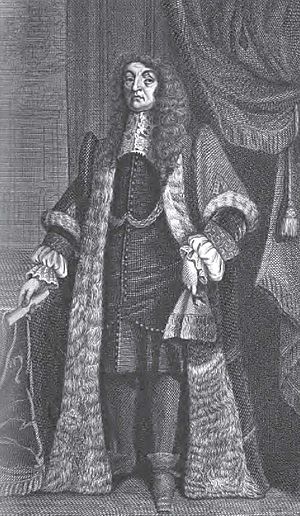Slingsby Bethel facts for kids
Slingsby Bethel (1617–1697) was an English politician who lived during a very important time in England's history: the English Civil War. He was a Member of Parliament and believed in a republic, which means he thought the country should be run by elected leaders, not a king.
Contents
The Early Life of Slingsby Bethel
Slingsby Bethel was born in 1617 in Alne, North Yorkshire. He was the third son of Sir Walter Bethel. His mother, Mary, was the daughter of Sir Henry Slingsby. Because he was a younger son, he started a career in business. He moved to Hamburg in 1637 and lived there for many years, until December 1649.
Slingsby Bethel During the Civil War
Slingsby Bethel was very much against the cavaliers, who supported King Charles I during the English Civil War. However, he also didn't fully agree with Oliver Cromwell, who became the Lord Protector after the King.
In 1659, Slingsby Bethel became a Member of Parliament for Knaresborough. He did not support Richard Cromwell, Oliver Cromwell's son, when he tried to become the next leader with full power.
Slingsby Bethel also helped his family. His uncle, Sir Henry Slingsby, had his lands taken away because he supported the King. Slingsby Bethel helped buy these lands back so they could stay in the family.
Life After the King Returned
After the King returned to power in 1660 (this was called the Stuart Restoration), Slingsby Bethel had become quite wealthy from his business. He owned a lot of land in the East Riding of Yorkshire. For many years, he lived a quiet life in London. He didn't actively oppose the government, even though he didn't fully trust it.
Becoming Sheriff of London
On June 24, 1680, Slingsby Bethel and Henry Cornish were chosen to be sheriffs of London and Middlesex. Sheriffs were important officials who helped with law and order. However, they initially couldn't take the job because they hadn't taken certain oaths required by a law called the Corporation Act.
At this time, England was divided into two main political groups: the Whigs and the Tories. Bethel and Cornish were supported by the Whig party, which was more popular in the city. Some people who didn't like Bethel made fun of him. For example, a historian named Roger North said Bethel looked more like a "corncutter" (someone who trimmed corns on feet) than a sheriff! The famous writer John Dryden even wrote about Bethel in his poem Absalom and Achitophel, making him seem like a bad character.
Another historian, Gilbert Burnet, described Bethel as a "known republican" and a "sullen and wilful man." Burnet also mentioned that Bethel and Cornish took a special religious ceremony (the sacrament) to qualify for the sheriff job, even though they were Independents (a type of Protestant). This surprised many people. After taking the sacrament, they were elected by a large number of votes.
Challenges and Troubles
When Bethel and Cornish finished their term as sheriffs in 1681, they were thanked by a grand jury in the city. However, Bethel faced more challenges. He tried to become an alderman (another city official) but lost.
He was also accused of visiting a prisoner named Edward Fitzharris in Newgate with a message from a lord. This accusation was quickly denied in a pamphlet.
Bethel tried to get elected to Parliament again for Southwark in February 1681. His opponents spread rumors that he was a Catholic, a spy, a cruel soldier, or even involved in the execution of King Charles I. A pamphlet called The Vindication of Slingsby Bethel was published to deny these false claims. He lost this election.
Later, in October 1681, Bethel was found to have interfered with people trying to vote during the election. He had moved two men who were stopping his supporters from casting their votes. He was given a small fine for this. In the same month, Slingsby Bethel showed his kindness by giving a lot of money to help poor people who were in prison because of debt.
Retreat and Return
In July 1682, Slingsby Bethel decided it was safer to leave England and went back to Hamburg. He stayed there until February 1689. While he was away, he was found to have been involved in a disturbance during a sheriff election the previous year. He and others were ordered to pay a large fine for this.
After William III and Mary II became the new King and Queen, Bethel and others who had been fined asked the King to forgive them. Slingsby Bethel passed away in February 1697.
Slingsby Bethel's Writings
Slingsby Bethel wrote several books and pamphlets. Here are some of them:
- In 1659, he published A true and impartial Narrative of the most material Debates and Passages in the late Parliament. This book talked about important discussions in Parliament.
- He also wrote The Interest of Princes and States (1680). In this book, he wrote about his ideas for free trade and religious freedom.
- Another book, The World's Mistake in Oliver Cromwell (1668), criticized Oliver Cromwell's actions, especially his foreign policy.
- In 1673, he wrote Observations on the Letter written to Sir Thomas Osborn. In this, he argued that England should support the Dutch Republic against France.
- His last work was The Providence of God observed through several ages towards this Nation (1691). This book looked at how the Stuart kings tried to gain more power.
Images for kids
 | Isaac Myers |
 | D. Hamilton Jackson |
 | A. Philip Randolph |



